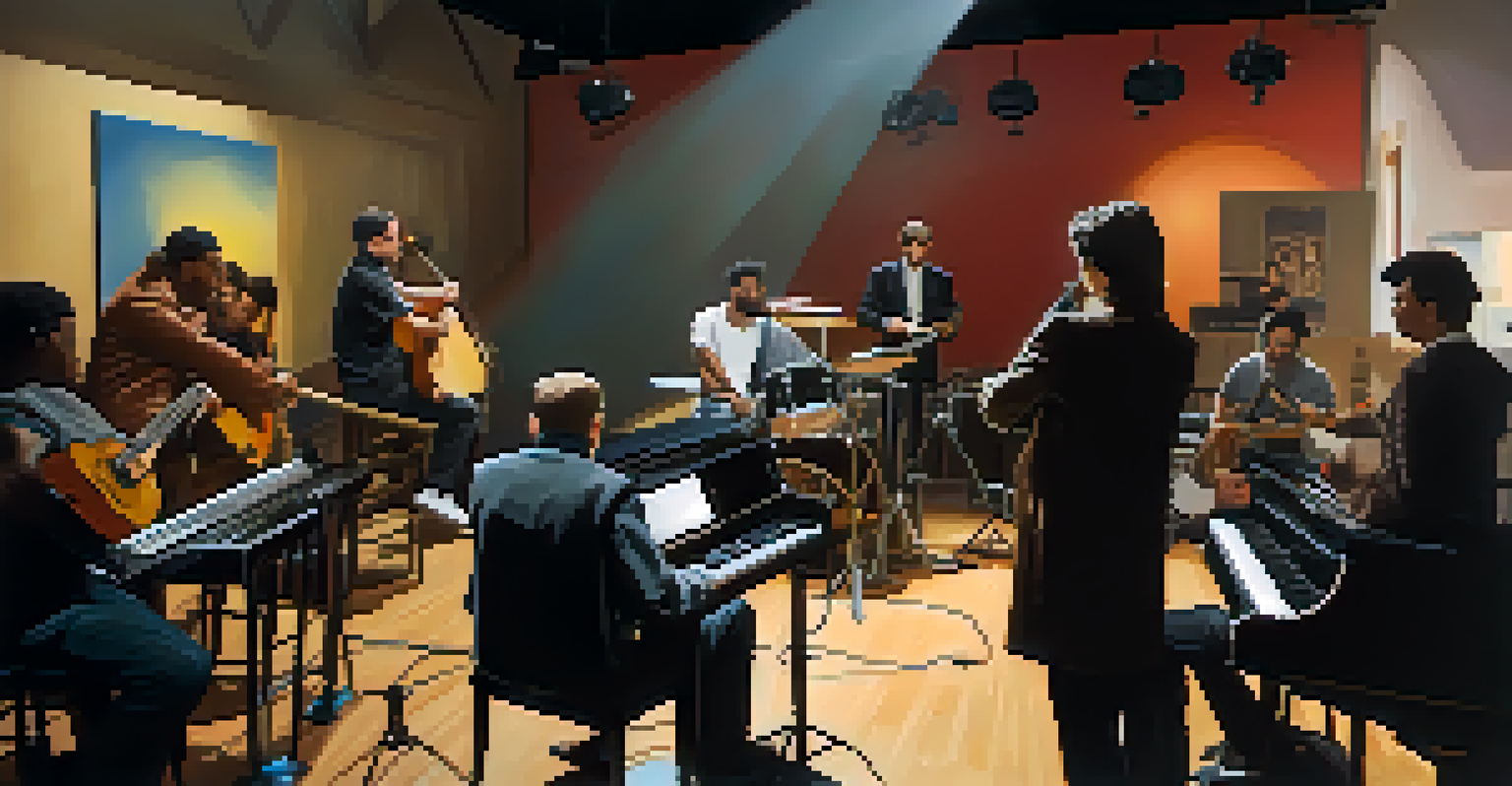Soundtrack Sales: The Financial Power of Film Music

Understanding the Soundtrack Market Landscape
The soundtrack market has evolved dramatically over the years, driven by changes in technology and consumer behavior. Once primarily reliant on physical sales, today's soundtracks thrive in a digital ecosystem. Streaming platforms have revolutionized how listeners access and enjoy film music, leading to an explosion in sales and consumption.
Music can evoke emotions and memories, driving sales beyond just the film itself.
For instance, the popularity of platforms like Spotify and Apple Music has made it easier for fans to discover soundtracks from both blockbuster films and indie gems. This shift has opened up new revenue streams for artists and filmmakers alike, as audiences increasingly turn to soundtracks to relive their favorite movie moments. Understanding this landscape is crucial for anyone looking to capitalize on the financial opportunities it presents.
In this context, the soundtrack industry is not just about music; it's about creating a lasting connection between the film and its audience. As films continue to be produced across various genres, the demand for soundtracks remains a lucrative market.
The Role of Streaming Services in Soundtrack Sales
Streaming services have become the cornerstone of soundtrack sales, offering unprecedented access to a vast library of music. With millions of users worldwide, these platforms provide an ideal avenue for promoting film soundtracks. The ability to create playlists featuring songs from various films allows listeners to engage with soundtracks in a whole new way.

Moreover, streaming platforms often feature curated playlists that highlight new releases, making it easier for fans to discover the latest soundtracks. This not only boosts exposure for the films but also creates additional revenue for artists through streaming royalties. As more people turn to these services, the potential for soundtrack sales continues to grow.
Streaming Transforms Soundtrack Sales
Streaming platforms have revolutionized how soundtracks are accessed and consumed, creating new revenue opportunities for artists.
The synergy between films and streaming services is evident—when a soundtrack gains traction on these platforms, it can lead to increased interest in the film itself. This interconnectedness is a powerful driver of both sales and viewership, showcasing the financial power of film music.
The Impact of Social Media on Soundtrack Popularity
Social media has become an essential tool for promoting soundtracks, allowing fans to share their love for film music instantly. Platforms like TikTok and Instagram have given rise to viral trends, where snippets of soundtracks can capture the attention of millions. These trends can significantly boost sales and streams, illustrating the potential of social media as a marketing powerhouse.
The financial power of film music will continue to grow.
For example, a catchy song from a movie can become a viral sensation, leading fans to seek out the full soundtrack. This not only enhances the film's visibility but also drives revenue for the artists involved. By leveraging social media, filmmakers and musicians can create buzz around their soundtracks, turning them into cultural phenomena.
The influence of social media on soundtrack sales underscores the importance of engaging with fans online. By fostering a community around the music, creators can enhance their financial success while also building a loyal fanbase.
Collaborations Between Artists and Filmmakers
Collaborations between artists and filmmakers have become a key strategy for enhancing soundtrack sales. When popular musicians contribute to a film's score or soundtrack, it can create significant buzz and draw their fanbase to the movie. This not only increases sales but also enhances the film's cultural relevance, making it more appealing to a broader audience.
A great example of this is the collaboration between Billie Eilish and the James Bond franchise. Her song 'No Time to Die' not only topped charts but also generated significant interest in the film itself. Such partnerships create a win-win situation where both the film and the artist benefit from the increased visibility.
Social Media Drives Soundtrack Buzz
Social media platforms allow fans to share and promote soundtracks, significantly boosting their visibility and sales.
These collaborations also help in crafting a unique sound that resonates with audiences, making the soundtrack an integral part of the film's identity. As more filmmakers recognize the potential of such partnerships, we can expect to see even more innovative collaborations in the future.
The Importance of Licensing and Royalties
Licensing agreements play a vital role in the financial success of soundtracks. When a film uses a song, the filmmakers must secure the rights to include it in the soundtrack, which often involves negotiations with artists and record labels. These agreements can lead to substantial financial gains for all parties involved, provided the film and its music resonate with audiences.
Royalties from streaming and sales are another critical aspect of the soundtrack's financial framework. Artists receive a portion of the sales revenue, which can be significant if the soundtrack performs well. For instance, a well-received film can lead to a surge in sales, providing artists with a lucrative income stream.
Understanding the intricacies of licensing and royalties is essential for anyone involved in the soundtrack industry. By navigating these complexities, filmmakers and musicians can maximize their financial benefits while ensuring that the music enhances the cinematic experience.
Case Studies of Successful Soundtrack Sales
Looking at successful soundtracks can provide valuable insights into what drives sales in the industry. For example, the soundtrack for 'Guardians of the Galaxy' became a massive hit, largely due to its nostalgic mix of classic hits and its connection to the film's vibrant aesthetic. This success highlights how music can evoke emotions and memories, driving sales beyond just the film itself.
Another example is the soundtrack for 'The Greatest Showman,' which topped charts worldwide. The film's music resonated with audiences, leading to a surge in sales and streams, and demonstrating the potential of a well-crafted soundtrack. These case studies illustrate the power of soundtracks in influencing both film viewership and music sales.
Collaborations Enhance Market Appeal
Partnerships between filmmakers and popular musicians can create significant buzz, driving interest and sales for both the film and its soundtrack.
By analyzing these successes, filmmakers and musicians can glean lessons on how to create soundtracks that connect with audiences. Ultimately, the right mix of music, marketing, and emotional resonance can translate into significant financial success.
Future Trends in Soundtrack Sales
As technology continues to evolve, so too will the landscape of soundtrack sales. Emerging trends such as virtual reality experiences and interactive soundtracks are paving the way for innovative ways to engage audiences. These developments could redefine how soundtracks are consumed and marketed, potentially leading to increased sales and interest.
Additionally, the rise of independent films and their unique soundtracks offers a fresh perspective on the industry. As more filmmakers explore unconventional music styles, the soundtracks can attract niche audiences, providing new opportunities for financial growth. This diversification may lead to a richer and more varied soundtrack market.

Looking ahead, it’s clear that the financial power of film music will continue to grow. By staying attuned to these trends, industry professionals can harness new opportunities, ensuring that soundtrack sales remain a robust component of the film industry.